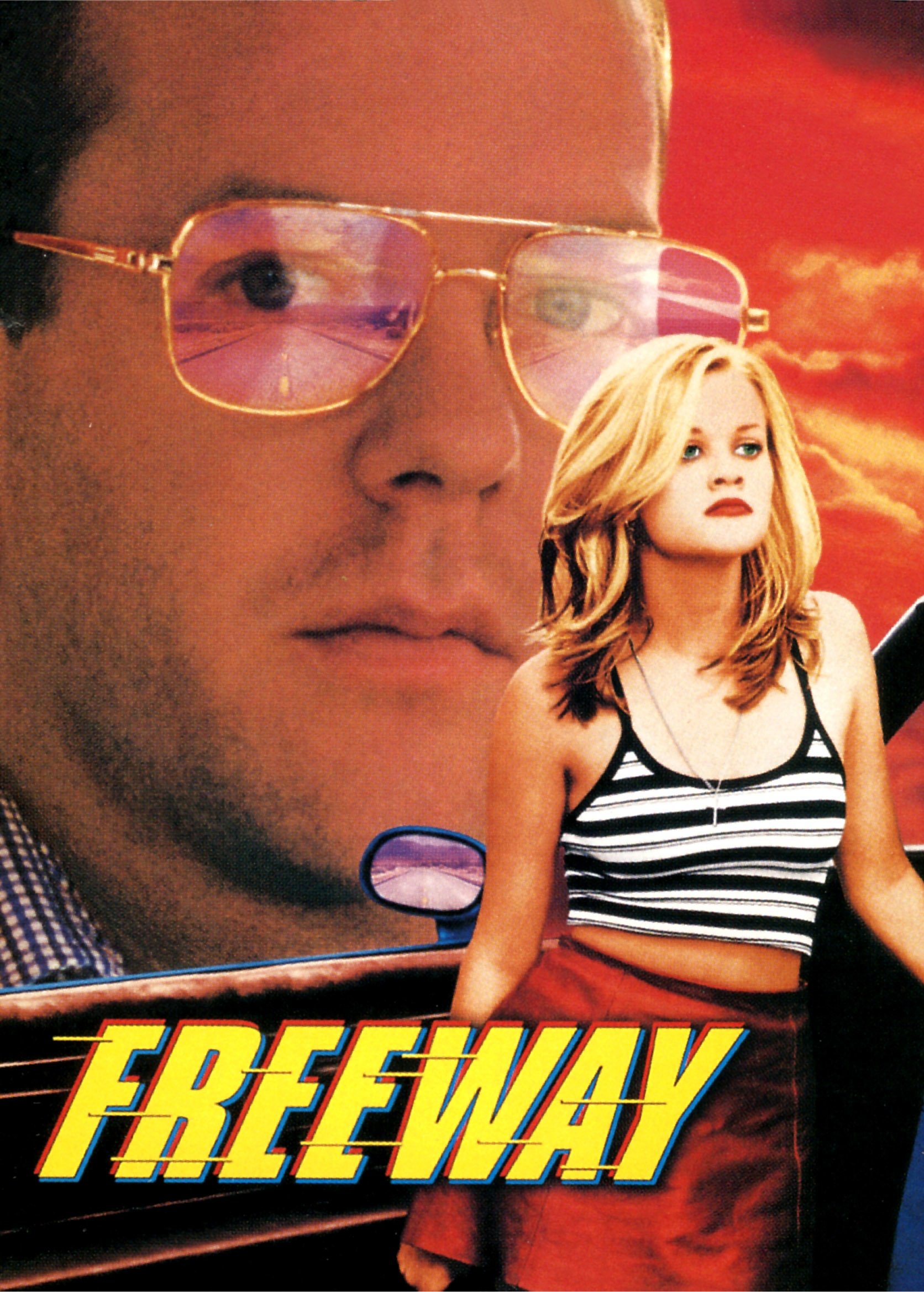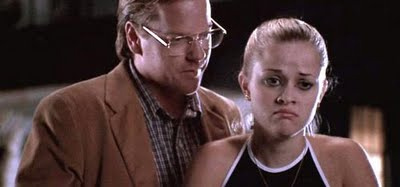 |
| From https://image.tmdb.org/t/p/original/ 5Nj3vDzWaakdqFHPvMdGkcvRFZf.jpg |
Director: Matthew Bright
Screenplay: Matthew Bright
Cast: Reese Witherspoon (as
Vanessa Lutz); Kiefer Sutherland (as Bob Wolverton); Wolfgang Bodison (as
Detective Mike Breer); Dan Hedaya (as Detective Garnet Wallace); Amanda Plummer
(as Ramona Lutz); Brooke Shields (as Mimi Wolverton)
 Synopsis: When her mother is arrested for soliciting, and her step
father is arrested at the same time for drugs and for potentially molesting
her, delinquent teenager Vanessa Lutz (Witherspoon)
decides to search for her grandmother on her late father's side, hitchhiking
when the car she borrows breaks down in the middle of the freeway. The person
who picks her up is boys' school councillor Bob Wolverton (Sutherland), who seems sweet and understanding of her problematic
upbringing but starts to reveal a psychotic side to him as the trip continues.
Synopsis: When her mother is arrested for soliciting, and her step
father is arrested at the same time for drugs and for potentially molesting
her, delinquent teenager Vanessa Lutz (Witherspoon)
decides to search for her grandmother on her late father's side, hitchhiking
when the car she borrows breaks down in the middle of the freeway. The person
who picks her up is boys' school councillor Bob Wolverton (Sutherland), who seems sweet and understanding of her problematic
upbringing but starts to reveal a psychotic side to him as the trip continues.
Matthew Bright is certainly a one-off; writing his first script for
Forbidden Zone (1980) and starring
in it under the pseudonym of Toshiro Boloney as Squeezit the Chicken Boy and
his twin sister René Henderson is certainly as unique a debut as you can get
and he went on from this in his own offbeat path. Before seeing Freeway, even
Forbidden Zone, my first Bright film was Freeway
2: Confessions of a Trick Baby (1999), a separate narrative with another
actress in the lead memorable for Vincent
Gallo playing a transvestite nun. Then there was Tiptoes (2003), a film even if its politically incorrect to say
this can only be described as a Life Time
melodrama about dwarfism where, considering a talented actor like Peter Dinkledge was in the cast in an
early role, Gary Oldman spends the
narrative on his knees as the dwarf brother of Matthew McConaughey. Bright
in the world of cinema, as well as being completely alien to political
correctness, is an apt candidate for the Hunter
S. Thompson description of being " too weird to live too rare to die"
and the fact that Tiptoes was his
last film and, alongside Bundy (2002),
only directed four films emphasises this fact.
 |
| From https://moonwolves.files.wordpress.com/2011/08/freeway-3.jpg?w=479 |
Unlike Forbidden Zone, which is a zany musical document of the original
version of the Mystic Knights of Oingo
Boingo, Freeway arguably has a
political side behind its transgressive personality in how it deals with
poverty row working class and a female juvenile delinquent who in a fifties
exploitation would be a one dimensional danger to wholesome society. Witherspoon's Vanessa is a very morally
grey person, capable of horrific violence and detached from human sympathy to
others but also a troubled young woman whose upbringing is tragic, a
charismatic and lovable person in spite of her behaviour thanks to a great
debut performance from Witherspoon
and Bright's script willingly
celebrating amorality through the character. This is more so when a far more
amoral figure, completely unsympathetic and evil, exists in Sutherland's Bob Wolverton, at first a
likable adult who gains Vanessa's trust as he takes her in his car to her
destination but is quickly revealed to be a monster who gets off scot-free as a
victim, Vanessa viewed as the stereotypical "white trash" criminal
sent to juvenile detention as the prosecutor argues she should be in jail for
her act of violent self defence against him.
| From http://cdn.chud.com/a/a7/800x1000px-LL- a7373d91_DVDPlayerScreenSnapz005.jpeg |
Stereotypes of the working class in
American films are rife and problematic; like rednecks, they are the one group
people somehow get away with mocking without consequence, the same vitriol in
the jokes that would be homophobic, racist and misogynistic if used at the
expense of another group. Freeway's
willingness to be distasteful and sordid means you're forced onto the side of Vanessa,
who can be remorseless and break another girl's nose when angry but is as much
someone who only became that way because of being treated as garbage by
society. Discrimination and bigotry is found in the police towards her as much
as she can be bigoted to others, and the un-PC dialogue having a depth when characters
show layers, such as Vanessa having an African-American boyfriend Cutter (Bokeem Woodbine) who she loves dearly
but willingly using racial epilates when a black police detective Detective
Mike Breer (Bodison) first calls her a "hooker" and a
"trickbaby" during an interrogation. That it's a female protagonist
is even more significant. As it's bigoted to mock the working class American,
there's as much a deep seated sexism that looks down on working class women
more so for their class status - those in films who work in diners, those who
are drug addicts in movies, those in juvenile detentions or went to prison,
those who are prostitutes in movies or are the children of sex workers. To be
gladly on the side of a young woman who, not to spoilt the film, has a history
pyromania and shoplifting, is unrepentant in a lot of her behaviour, and
escapes juvenile detention by way of an official and a guard being killed
within her influence is very subversive. Unlike the cute but ultimately middle
class attitude to such a character in Citizen
Ruth (1996), where Laura Dern
plays a solvent addict who realises she's pregnant and becomes the object of an ideological
tug-of-war, Bright's decision to
throw good taste out the window and throw everything including the kitchen sink
back in is actually more progressive in hindsight for not getting on its moral high
horse about the subject and try to have a blatant satirical message. Effectively,
the John Waters attitude of
respecting even those on the extreme borders of class and morality, and it
wouldn't be a surprise if he loved this film for this and many reasons.
| From http://secondclasscinema.com/wp-content/ uploads/2015/08/FreewayEpImage3.jpg |
It's a grimly humorous film as a
result, bordering on an absurd weirdness and yet having a smorgasbord of taboos
including a serial killer that forces a viewer into a ringer about what they
see. It belongs to a clear subgenre of the nineties, which only existed in that
decade with this specific style, of American films (many involving roads or
actual road movies) which had very nihilistic or black humoured views of the
world, usually with a lot of gore and the nineties aesthetic at their most
saturated including in the soundtracks. David
Lynch's Wild At Heart predated
them at the cusp of 1990 and includes the likes of Oliver Stone (Natural Born
Killers (1993) and U-Turn (1997))
to Gregg Araki (The Doom Generation (1995)). Freeway
is amongst them also showing their habit of casting actors that would become
exceptionally popular later on or already had followings - here with a young Renee Witherspoon to a young Rose McGowan in The Doom Generation - and like them they all have the effect of the
viewer being spiked with a hallucinogen when watching them, the border between
the tasteless and the satirical sharpness blurred as far as possible that it's
amazing a few of these films were high budgeted Hollywood productions.
| From http://67.media.tumblr.com/0a51bfbc2e8fe53a4b7edcb30f025fe2/t] umblr_mnx2sjz2fh1s9frcro10_1280.jpg |
Technical Detail:
Bright's debut film, originally made for television for HBO but built upon for a theatrical
release when it gained positive responses, it's solidly made and ultimately
more like bathing in the nineties aesthetic than stylish, in itself as much a
style that it wears with pride with its plastic flamingos and grey highways.
Instead it's the script and personality that stands out more. The score from Danny Elfman adds a great deal as well,
stepping out from the stereotype of his work with Tim Burton and leaning towards the weirdness of his Oingo Boingo work, the vibes of Forbidden Zone within it after their
first collaboration on that film.
The performances in this film are
as much part of its makeup and the biggest aspect of its tone. Renee Witherspoon is exceptional, making
the fact that her career has very few films like this that allowed her to
subvert the public view of her very disappointing; these nineties films had a
lot of great and debut performances from actresses, from Rose McGowan to Rosario
Dawson in Kids (1995), who sadly
don't get the recognition they deserve in terms of acting ability and charisma,
these types of meaty roles in edgier and bolder films the kind they deserve and
need more of. The same can be said for Kiefer
Sutherland too; already engaging when he's transitioning from a wholesome
man to a lunatic, the moment a certain prophetic is given to him he dials up
his performances to an even greater height of creepy magnetism. The cast in
general is pretty strong - Dan Hedaya
and Wolfgang Bodison as two police
detectives have a very interesting and argumentative relationship with each
other, the characters' conflicting views a standout in terms of the film's tone,
as is Brooke Shields in a small role
that stops feeling like stunt casting as her narrative path becomes the
blackest, hollow humour possible, the kind of humour that you'll feel the need
for a cold shower afterwards if you find it completely unfunny and disturbing.
Abstract Rating (High/Medium/Low/None): None
This is a case where, rather than
strange imagery or a weird plot structure, it's the tone and deliberate
provocation which causes it to feel weird. It's a mild form which could be
contested on rewatches; it gives the film an unrelenting, sordid edge but whether
this would mean it would get on the Abstract
List is up to debate. At the point of this review being created, it
wouldn't.
Abstract Spectrum: Grotesque
Abstract Tropes: Teenage Rebellion; Provocative Dialogue; Serial
Killer; Facial Disfigurement; Cheering on Amoral Anti-Heroes
Personal Opinion:
An edgy gem. Not for everyone but
for those with the stomach for something this dark, this is a neglected and
underappreciated film that deserves more attention given to it.
No comments:
Post a Comment